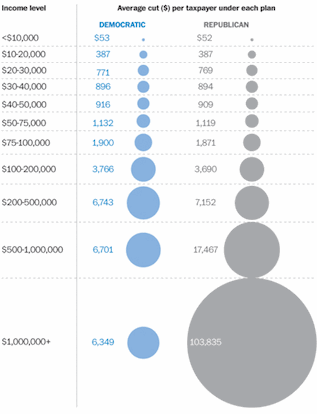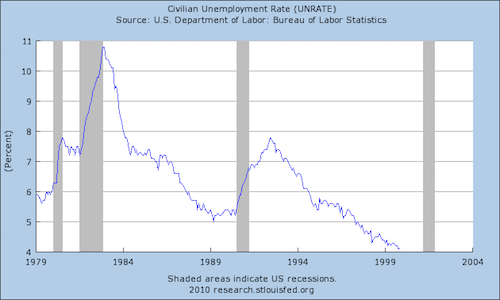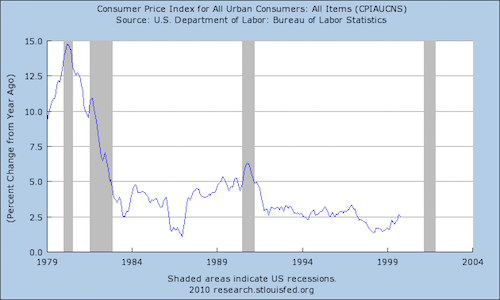Matthew Yglesias's Blog, page 2478
December 6, 2010
Morning in America
Just a reminder that though the "morning in America" recovery that led Ronald Reagan to a landslide re-election in 1984 certainly represented a rapid amelioration of conditions, in absolute terms the labor market in '84 was actually still pretty bad:
Somewhat similarly, inflation was much improved for where it had been in the 1970s, but remained higher than what what's been considered acceptable for the past twenty years:
This is just to say that though Barack Obama's forward-looking political prospects are closely linked to the fate of the economy, the challenge of getting the country back to full employment and the highest-possible standard of living is actually a substantially bigger one than the challenge of merely doing "good enough" to win re-election.


Who Wins When Android Wins?
Fred Wilson argues that current trends will likely continue and Android will emerge as the dominant operating system for mobile devices, outpacing Apple's iOS:

Obviously straight-line trend projection is a mug's game, but the basic logic seems compelling. But of course this is a reminder that competition in the mobile marketplace is multifaceted. On the one hand Apple makes an operating system that competes with Google's operating system. On the other hand Apple makes phones that compete with phones from Motorola, HTC, Nokia, etc. If a whole bunch of different device-manufacturers all use Android, they may all end up with thin profit-margins and giant combined sales totals, even while Apple earns high margins and relatively modest sales.
The question I suppose is who winds up as the Microsoft in this scenario. In the PC business, Apple the computer-maker ultimately ended up pretty successful compared to other computer-makers, but Apple the OS-maker was a failure compared to Microsoft the OS-maker. So in mobile does Google play the role of Microsoft? Maybe, but Microsoft wasn't (and isn't) giving Windows away for free.
Instead it seems to me that in mobile devices the people who end up extracting the bulk of the monopoly rents will be the people who own the broadband spectrum—Verizon, AT&T, TMobile, Sprint, etc.—since that's the limited commodity. Which is a roundabout way of getting to the reminder that regulating this sector in an appropriate way is a key task of 21st century policymaking. There's competition among wireless service providers, but it's an inherently limited form of competition because it's extremely difficult to have new entrants.


The Anti-Populist Populace

(cc photo by LateNightTaskForce)
Alex Tabarrok points us to an interesting bit of 1996 public opinion research which revealed the following:
Imagine that you faced a choice for the United States between the following two extreme possibilities, which would you choose?
1) The US would have in the next 10 years an inflation rate of only 2% a year, but an unemployment rate of 9%, thus about 12 million unemployed.
2) The US would have in the next ten years an inflation rate of 10% a month, but an unemployment rate of only 3%, thus about 4 million unemployed.
About 75 percent of survey respondents chose option one. Now I would say this isn't super-duper relevant to our current situation since the high-inflation scenario on offer is much more extreme than anything I've heard anyone propose. But the fact that the public is more tolerant of high-unemployment than of high-inflation is suggestive.
On a related note, I observed over the weekend that even amidst the worst labor market crisis in many decades, the vast majority of people who want a job have one. Which is to say that an unemployment rate of 9.8 percent means a non-unemployment rate of 91.2 percent. Some people took that to mean me saying that we should be complacent about sky-high unemployment. I absolutely reject that. High unemployment is a moral and economic disaster. But in political terms it does matter. The costs of high unemployment are disproportionately borne by the unemployed minority. If the non-unemployed majority fears that measures to reduce unemployment—whether they involve higher deficits or a higher rate of increase in the price level or what have you—are likely to come at their expense, then building political support for said measures will be challenging. It's especially worth noting that senior citizens are extremely insulated from labor market conditions and have emerged as a critical pro-conservative voting bloc.
To regard the politics of 9.8 unemployment as a zero-sum competition between the interests of the unemployed and the non-unemployed is a mistake but it's very common for people to mistakenly over-estimate the zero-sum element of policy debates.


Nationalization and Bailouts
I was having a diffuse Twitter disagreement about TARP earlier that I think is worth blogging on.
A key point here is to pay attention to the fuzzy distinction between "bailouts" which are evil and "nationalization" which is seen by many as a wholesome populist alternative. This is, I think, an analytical error. TARP was a step on the road to nationalization, and if you think there should have been more nationalization then what you think is that there should have been more TARP, not less. After all, what was TARP? TARP was a program of "capital injection" into banks at a time when bank stock prices were depressed. The government took equity positions in large American banks. That helped give the banks enough money to continue paying their debts. "Nationalizing" of banks would have meant injecting even more capital into the banks so that they'd be wholly owned by the government, and then having the government fully assume responsibility for the banks' debts.
This nationalization is basically what Ireland did. Except in the case of Ireland people have taken to calling nationalization a "bailout."
And I don't object to that terminology. What Ireland did was nationalize banks (thus wiping out their owners) and then bail out the banks' creditors. This has ended up bankrupting the Irish state and looks like a giant mistake, but this is what a nationalization scenario in the United States would have looked like—a wipeout of bank owners and a bailout of bank creditors. The US is in a different situation from Ireland, so I think it's very plausible that a policy which has failed in Ireland would have worked out well in the United States. And it would have provided an opportunity to restructure the banking industry in a number of beneficial ways. So if you want to say nationalization would have been a better idea than TARP, then I'll applaud you. But keep in mind that nationalization would have been TARP on steroids not an alternative to "bailouts."


Adjustment Asymmetries

Enlightening analysis of the European situation from Nick Rowe:
Keynes worried about this asymmetry, but Bretton Woods never really resolved it. It's one of the reasons that Bretton Woods fell apart. Countries that ran chronic balance of payments deficits sometimes were forced to devalue. I can't think of a case where a country that ran a chronic balance of payments surplus was forced to revalue. Because they weren't forced to do anything. (Though one of the reasons Canada chose to adopt a floating exchange rate in 1950 (pdf) was to allow the Canadian dollar to appreciate, which might be a partial exception?)
And I think that very same asymmetry is at work in the Eurozone right now. Germany should adjust one way, with higher prices, higher spending, or by leaving the Euro. And countries like Ireland and Greece should adjust the other way, with lower prices, lower spending, or by leaving the Euro. But Germany can choose to adjust. Ireland and Greece are forced to adjust.
And Germany doesn't seem to want to change course; there are plenty of disagreements in Germany politics but fundamental support for an export-oriented economic model is across the board. So someone else will, in the end, have to adjust.


Rushing to Deport

Here's another one for the "obsessive focus" file as the Center for Investigative Reporting shows that the Obama administration undertook a politically motivated deportation wave for the sake of a random talking point:
For much of this year, the Obama administration touted its tougher-than-ever approach to immigration enforcement, culminating in a record number of deportations. [...]
When ICE officials realized in the final weeks of the fiscal year, which ended Sept. 30, that the agency still was in jeopardy of falling short of last year's mark, it scrambled to reach the goal. Officials quietly directed immigration officers to bypass backlogged immigration courts and time-consuming deportation hearings whenever possible, internal e-mails and interviews show.
The article focuses on a number of stats-juking methods undertaken in an effort to set the record. This is apparently not particularly unusual and I'm not particularly scandalized by it. The real problem, I would say, is simply with the goal. There's no reason to think that setting about to undertake a record number of deportations was a good idea. It's inhumane, it's bad for economic recovery, and you don't need to be a telepath to see that the motivation here was political rather than substantive. And while I of course don't want to say that this is somehow the key to our present-day economic situation, the fact of the matter is that the administration's main political problems today are attributable to the economy and not to messaging failures. And yet for the sake of messaging, the administration undertook a variety of initiatives that were counterproductive to the economy. This is one.


The Real Tax Cut Sellout

I'm no happier with the political bungling of the tax cut debate than anyone else, but it is worth noting that from a policy point of view it's not like the pre-sellout position of the Obama administration was some kind of progressive gold mine. The Clinton administration left us with a tax code that, though economically inefficient, raised adequate revenues to meet the federal government's medium-term fiscal commitments. The Bush administration did nothing to improve the efficiency of the tax code, but did cut rates to the point where the revenues raised were pathetically inadequate. The Obama proposal to continue the "middle class" tax cuts (which provided larger tax cuts to rich people than to middle class people) while allowing the tax cuts that only rich people benefit from to expire would have left us with a tax code that was still inefficient and still inadequate to our revenue needs.
Which is just to say that taxes is an issue where I side with Obama's progressive critics, but I wish critics did a better job of recognizing that the real sellout happened over two years ago when Obama surrendered to the conservative framing that taxes are evil and public services are never worth paying for.
Looking forward, the pledge to never raise a single dime of tax revenue from anyone earning less than $250,000 a year is a way of crippling policymaking. It's not just that it makes it hard to raise adequate revenue, it actually serves to obscure real questions about the distribution of the tax burden in favor of fake questions about who is and isn't "really" rich. There are many measures, like phasing out the home mortgage interest tax deduction or the employer provided health insurance deduction, that would be economically efficient and progressive in their distributive impact but that would also, yes, entail some increase in the tax burden paid by some non-rich people. Conversely many "middle class tax cuts" in fact do more to cut rich people's taxes than poor or middle class people's taxes.
The progressive goal needs to be (a) adequate revenue, (b) more progressivity, and (c) economic efficiency. The President's initial proposal achieved (b) but didn't move the ball forward on (c), didn't get us close to where we needed to be on (a) and locked us into a rhetoric frame that made (a) and (c) difficult to accomplish. It was, in other words, a bit of a mess adopted for political reasons. And now the Democratic leadership can't even make the politics work. It's time to start over.


Wilders & Lieberman, Sitting in a Tree

One interesting development over the past ten years has been the tendency of European far-right parties to migrate away from their historic commitment to anti-semitism and toward an embrace of revisionist Zionism, with Islam-bashing serving as the conduit. Take this report on Dutch far-right leader Geert Wilders' meeting with Avigdor Lieberman:
The two politicians discussed international and party-political issues in a 'friendly atmosphere'. Mr Wilders en Mr Lieberman, who have known each other for a long time, met at the foreign ministry. The Freedom Party leader offered his condolences for the victims of the forest fires near Mt Carmel in northern Israel. More than 40 people have been killed in the fires so far.
Mr Wilders will remain in Israel for the time being, and give a speech in Tel Aviv on Sunday. In it, he will further clarify his position that Jordan "is the only Palestinian state that ever will be". Mr Wilders was invited to give a speech on the subject by Israeli MP Arieh Eldad, a member of the ultra-nationalist party National Union.
Birds of a feather, etc.


December 5, 2010
Efficient Advertising
Tom Lee on the paradox of better-targeted advertising:
But Google's a huge success in a landscape of failure. Online ads sell for pathetic rates relative to broadcast or print. This is because by all accounts online advertising doesn't work very well. You can measure whether someone clicks on an ad, and often whether they buy something after that click. But it turns out they rarely do those things. So businesses aren't willing to pay very much for ad space on websites.
Is it really a coincidence that the advertising medium with the best instrumentation also appears to be the least effective? I suspect it's not. It may be that ads never worked as well as the industry had told us; or it may be that the eyeballs/clicks/conversions funnel is a naive conceptualization of how the system works. Either way, Google has succeeded by giving advertisers what they think they want, which is analytic tools that seem to reveal that the whole enterprise is horribly ineffective.
To those of us on the editorial side of online media this is a very frustrating dynamic. It's hard to make money writing online because the advertising rates are pathetic compared to what was historically available in print. And the rates are pathetic because the utilization rates are pathetic. But what kind of click-throughs did those glossy magazine ads get? Something here doesn't add up.


Creative Destruction and the Welfare State
Recently, the rise of digital cameras put a lot of firms in the film and film-development trade out of business. But now it seems that smartphones are killing the market for point-and-shoot digital cameras.
Adam Ozimek observes that this is an example of "creative destruction" in action and says we should "[k]eep stories like these in your head for when someone argues that we are worse off because of some creative destruction."
And perhaps we should. To me, though, what keeping these stories in mind mostly does is drive home the case for a reasonably generous welfare state. As we see here, the ebbs and flows of technological change have profound implications for the organization of the economy. And while the forward march of technology is definitely a good thing, the metaphor that "a rising tide lifts all boats" is badly inadequate. The economic sea churns a lot, and it's very easy for decent, competent, hardworking people to suddenly find themselves worse off than they were the year before through no fault of their own. The guy with the film development shop didn't suddenly become lazier or less skilled the day his business became unviable, but he took an economic hit nonetheless. This churn and the attendant levels of risk and anxiety that it creates are an undesirable feature of the capitalist order. And the welfare state is the answer.


Matthew Yglesias's Blog
- Matthew Yglesias's profile
- 72 followers





